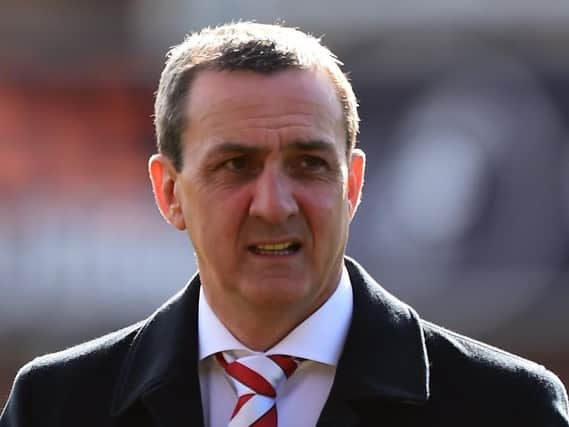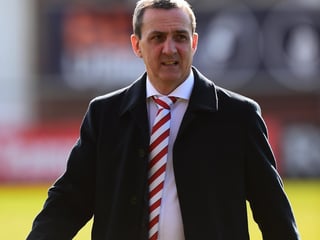Fleetwood Town chairman Andy Pilley unveils four-point plan to save clubs from extinction


Continuing his series of nightly videos on social media, the Town owner revealed a four-point plan he believes will save clubs threatened with financial ruin.
Pilley calls for a deferral of wages by players, a finance deal whereby TV companies pay the EFL up front and a salary cap for the lower leagues.
Advertisement
Hide AdAdvertisement
Hide AdHe also wants to see traditional season tickets replaced by the rolling subscription system already in operation at Highbury.
Pilley stated: "We have virtually no revenue coming into our football clubs whatsoever. We only have expenditure and that is going to remain the case for the foreseeable future.
"It may be autumn when we are back operating as normal. It may be Christmas when we are back playing in front of crowds; it may be spring next year, I don't know.
"I haven't got a crystal ball but what I do know is that we are facing a very real crisis right now and we need to find solutions.
Advertisement
Hide AdAdvertisement
Hide Ad"We need to be creative. We need to be inventive and tonight is my opportunity to deliver some workable solutions that will assist us in protecting our football clubs.
"Number one is that players need to agree a conditional deferral of part of their wages. I believe we need to work together; we need to share the burden. At times like this tough calls need to be made for the greater good.
"All of the non-playing staff (at Fleetwood Town) have already taken a reduction. All of my employees on furlough have taken a reduction and I think the players now need to do their bit.
"They need to help themselves and their futures by taking a conditional deferral. The conditions will be agreed by the parent clubs and the players. I've got lots and lots of time for players. I've got a great set of lads and I've had fantastic lads at my football club over the last 15 years. I've had a really good relationship with virtually all of them.
Advertisement
Hide AdAdvertisement
Hide Ad"I totally get that this is a short career. This is a high-pressure, high-risk occupation. You can have injury, poor performance and before you know it you can be part-time.
"However, this is now necessary and if we don't make these changes to help football clubs navigate their way through this crisis there is going to be a lot less employment opportunities for them moving forward.
"This has been recognised by the PFA, the body that is there to protect the players' best interests. If the PFA understand and recognise how serious this is, I would urge players to do the right thing and to agree a deferral with their clubs because it is in their best long-term and medium-term interests. There will be clubs going into administration and not paying players if deferrals are not made.
"There could be challenges on players' contracts. We don't want to get into that. Let's stick together. Let's get supporters, non-playing staff, players and owners all doing their bit to pull together and collectively we can help football clubs get through this.
Advertisement
Hide AdAdvertisement
Hide Ad"But we need this deferral. This saving is useful but is nowhere near enough to get us through this. It's a start. It's almost doing the decent thing is the way I see it.
"So football players if you are watching this, which I know you will be, please take on board what I've said and eventually something is going to happen. Let's all do it without falling out and collectively work our way through this incredibly difficult situation.
"Number two is a finance solution and I can't take the credit for this. I have to credit Darragh MacAnthony, the Peterborough chairman, who has a podcast that's an incredibly good listen. It's passionate and comes up with very good ideas about the ways to solve football's crisis.
"Darragh's suggestion is that we should finance the TV deal, which I believe has four or five years to run. The idea is that if the EFL gets the money in advance they can deliver emergency funds to save football clubs from non-existence.
Advertisement
Hide AdAdvertisement
Hide Ad"The money will be received up front by the EFL and then forwarded in monthly tranches to clubs. Not large amounts so the money can be squandered, but just enough so clubs can fulfil their minimum commitments.
"It's something that happens in the business world quite regularly - a finance deal that is an advance on future earnings. It can be done, I'm sure, and I think it's a really good solution which the EFL should be looking into making a reality.
"Solution number three is around season tickets. I think there is a real danger that people will not buy a season ticket as they normally do. Who is going to pay, say, £300 up front when it's highly probable they won't see a game until - who knows? - it might be Christmas, it might be spring next year at the earliest.
"Cash is going to be king for the public. We are heading into maybe not even a recession but a depression.
Advertisement
Hide AdAdvertisement
Hide Ad"I think the answer is a subscription-based model and I know this because I introduced it last year. You can charge perhaps £25 per month. It assists with people's cashflow.
"The beauty of this model is that people can be added at any time during the season. Another big advantage is that at the very end of the season you're not left with no season ticket holders. It will roll and you can build your fanbase year in, year out.
"It's worked for me and I had my best season ticket sales ever last season. I don't think football clubs have a choice but to come on to a model like this this year because I just don't see enough people paying the cash up front.
"Number four is in my opinion the most important because it's a longer-term solution: it's salary caps, budget control for the lower leagues.
Advertisement
Hide AdAdvertisement
Hide Ad"Football has the chance to press the reset button, to become sustainable for the first time in a long , long time.
"This would mean there is a divisional budget and no-one could ever overspend and put their club's future at stake. Obviously I brace myself for the accusation that that's what I've done historically. I cannot control the past. My football club is still in a reasonable state despite this crisis, but it's about the future.
"If other clubs go bust the competition becomes a farce. We must do all we can to avoid that.
"Just imagine a level playing field whereby the best team, the best manager, the best tactician wins the league, as opposed to who has the biggest budget and who is prepared to bankroll their club more than anybody else.
Advertisement
Hide AdAdvertisement
Hide Ad"Football is going to be played behind closed doors next season, so in my view there should be an absolutely level playing field and everyone in League One should have one budget they have to adhere to.
"It doesn't matter if you normally get more supporters than anyone else because the majority of games are going to be behind closed doors, so it should be the same budget for every club.
"I don't think any club should be allowed more than 25 players and at least four, if not five of those should be under 24 years old. We've got to start to develop future stars.
"That's how we are going to make money, make the business stack up financially and create the conveyor belt of talent for the Premier League.
Advertisement
Hide AdAdvertisement
Hide Ad"It's now or never. We have to make this happen. If we don't take these steps now, during this crisis, we never will. It needs voting in by the member clubs and if we're brave enough to do it we will protect our clubs' future forever.
"So chairmen, owners, let's get this over the line and have sustainable businesses that might actually break even or even make a profit and put some value back into our investments.
"It's the right thing to do. We've got to be less competitive, protect the people's game and make football more durable and sustainable."
